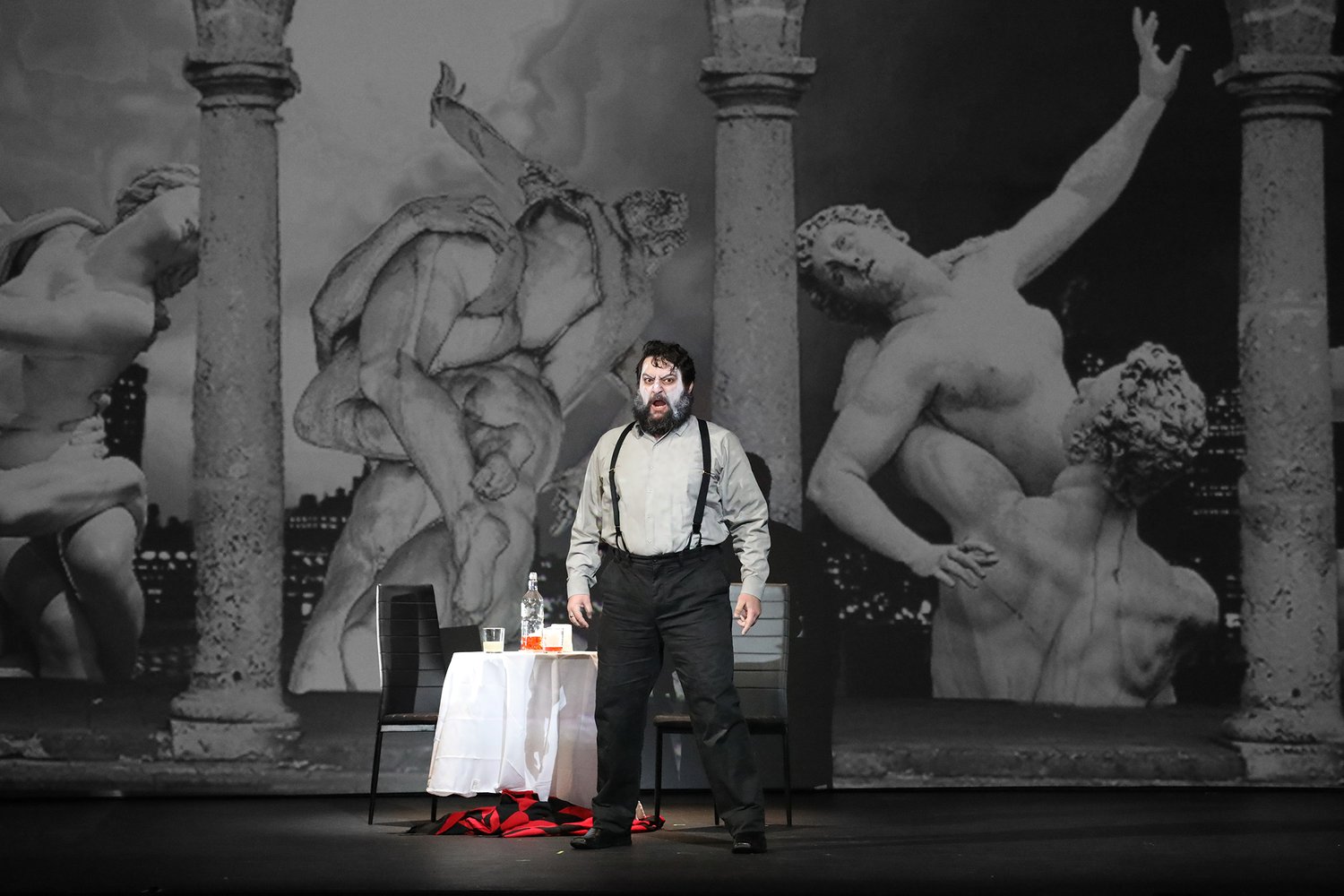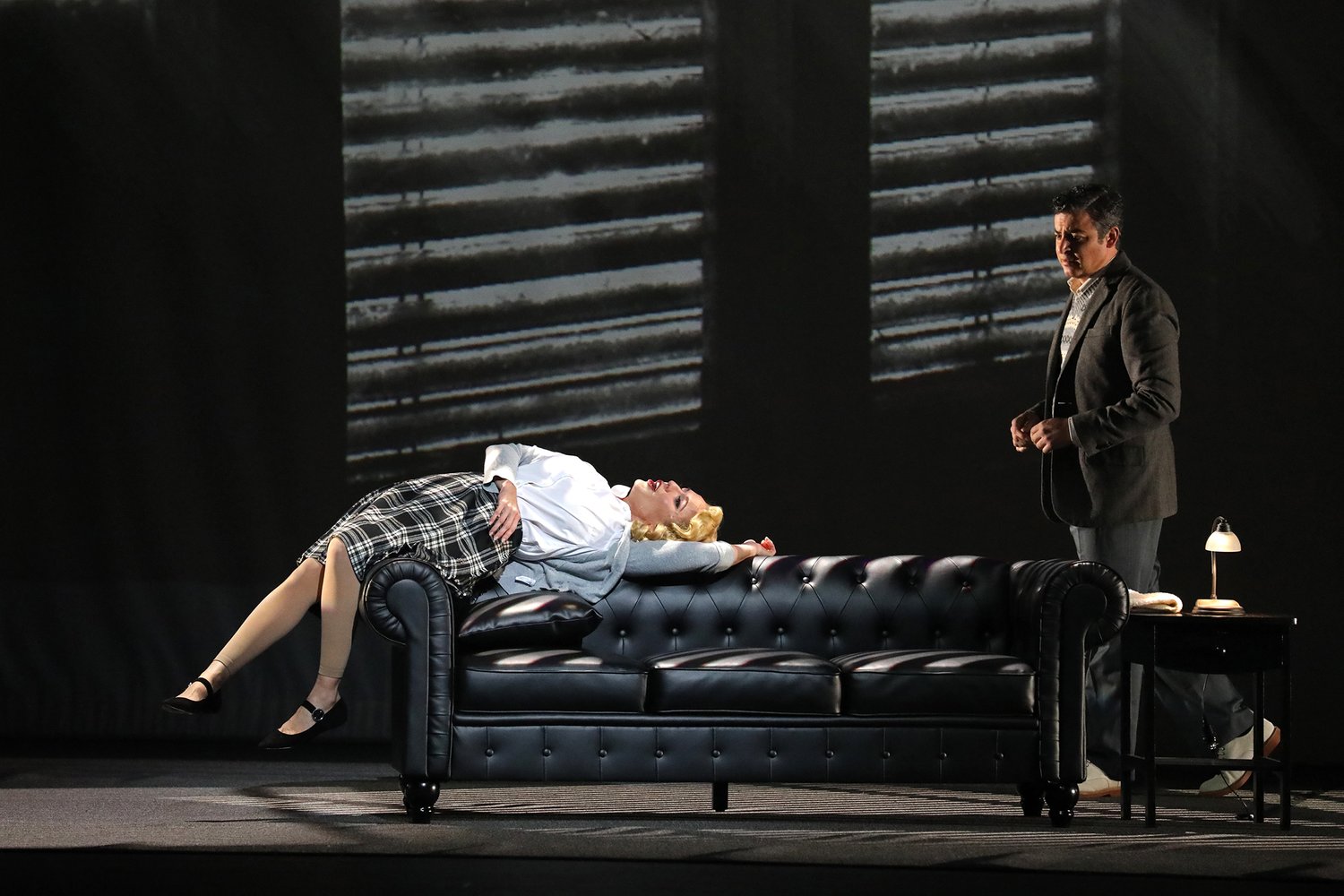From Nashville Opera
Rigoletto Noir…Finally!
Over the weekend, Nashville Opera finally managed to pull off their long-awaited Rigoletto Noir, complete with a three-minute, film-noir-inspired cinematic short created by Nashville natives Chris Hollo and Mark Mosrie of Penumbra Entertainment. While I wouldn’t go so far as to say it was worth the wait (nothing is worth the pandemic) the

evening seemed like a wonderful return to the way things used to be. When it comes to Italian opera, Giuseppe Verdi’s Rigoletto is a chestnut and has been one since its triumphant 1851 premiere in Venice, and this is despite its dark subject matter—Venetian Police Censors attributed a “‘disgusting immorality and obscene triviality” to Piave’s tragic libretto. Remarkably, this makes for an excellent noir narrative, a film genre characterized by cynicism and tragedy, and thankfully, Director Hoomes managed to avoid the trap of genre parody.
Onstage and fresh from his appearance as Shchelkalov in Boris Godunov at the Met, Ukrainian baritone Aleksey Bogdanov played an outstanding Rigoletto. With a dark instrument, awash in luster and bluster, and a charming presence in the Duke’s court, Bogdanov’s Rigoletto quickly becomes as threatening and self-centered as Leoncavallo’s Canino (shame in clown makeup and all) by the banks of the Cumberland (this staging is set in the Music City). Indeed, the brilliant staging has more than a little commedia dell’arte to it. Rigoletto’s jester’s smock, a part of his costume of shame, is patterned in blood red harlequin diamonds.
As Gilda, Soprano Sarah Coburn was beautiful, gentle, and delicate but with a full, bright instrument. Her “Caro nome” was the ideal. The fulcrum of Verdi’s tragedy, her character has a direct and predictable arc, which is central to the staging’s subtly diagetic, and yet ignored, expressions. As the Duke, tenor Daniel Montenegro seemed to have an off night (Thursday). His intonation and color were quite good in solo pieces, but just a bit weak in volume. It must be said that this role is a terrifying challenge given how often it has been sung by the great tenors—Pavarotti, Domingo, Carreras etc… The challenges created by this were well handled in the adaptive balance maintained by Maestro Williamson and Nashville Opera Orchestra. Unfortunately, Montenegro was often all but drowned out in the ensembles, especially the famous quartet in the grand finale.

Dean Williamson led the Nashville Opera Orchestra quite well, with nuance and a sense of forward motion. The opening scene complex with its sections of contrasting yet continuous music was quite fun and the chilling moments (the brassy curse idea in the overture, the sinister strings and woodwinds in Rigoletto’s duet with Sparafucile) were scarier than I think I have ever heard them.
The Courtiers were very well prepared by Amy Tate Williams, participating in the great fun of precipitating a tragedy. Their aural appearance as the wind in the great finale was absolutely chilling. Mezzo Emily Triebold was seductive and darling as Giovanni, and Kevin Thompson brought a pragmatic business sense and a huge bass voice to the role of the assassin Sparafucile. The costuming (June Kingsbury) Wigs & Makeup (Sondra Notttingham) and Lighting/Video Design (Barry Steele) deserve special mention for their huge contribution to this spot-on production. The biggest drawback, and probably what might fairly be considered Nashville Opera’s curse all these years is the hall. Andrew Jackson Hall at TPAC is just horrible for opera—too big and the sound and nuance gets lost in all that space. One waits in anticipation for Nashville Opera’s May 6 and 8 production of Richard Wagner’s music drama Das Rheingold in Belmont’s fancy-pants new performance hall. Perhaps it will have better acoustics.



